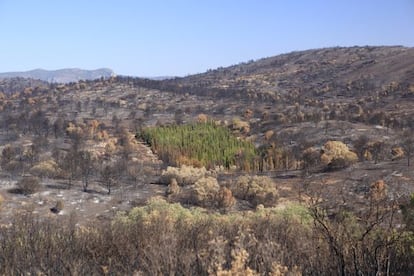The curious case of Valencia’s flameproof cypresses
Resistance of a clump of trees to a devastating forest fire has stunned experts


When Bernabé Moya, director of forests for the provincial delegation of Valencia, revealed the image, his botanist colleagues could not believe their eyes. A clump of 946 cypress trees, each nine meters tall, had resisted the fire that had devastated 20,000 hectares around the Valencia town of Andilla in July unscathed. The photo clearly showed a 9,000-square-meter area of cypresses, which had been planted 22 years ago in Jérica, between Valencia and Castellón provinces. All around, a devastated lunar landscape, where almost no vestige remained of the pine, oak, holm oak, juniper and gorse trees that had been consumed by the flames.
The mystery, and what it might mean, has reopened the debate surrounding forest regeneration. While some experts are in favor of employing cypresses as natural firebreaks, others reject the idea of planting species that are alien to the native habitat.
This peculiar island of cypresses suffered identically adverse conditions to those of the other trees around them: a year of low rainfall and the lethal "three 30s": temperatures of over 30ºC; less than 30-percent humidity and winds blowing over 30 kilometers per hour. So why were 90 percent of these cypresses spared from the flames?
There is no consensus among scientists about cypress trees' ability to fight or stop fire. The Mediterranean cypress is a hardy species, which accumulates few dead branches on the soil below it and only has a thin and compact layer of mulch - fallen leaves - around its base to preserve moisture. That would explain, according to the delegation's forests department, why the flames didn't penetrate the lowest areas, despite the fact that the local Herbasana ravine has not been cleaned up in a decade.
You could use the trees as a screen to surround inhabited areas"
Even more extraordinary is the behavior of the tops of the trees, according to Moya. Despite the fact that the trees are packed close together, the fire did not advance through the higher branches. Only 12 trees burnt - 1.26 percent of the total - which prevented the fire from spreading. What's more, the flames barely caused the drying out of the leaves of 10 percent of the cypresses. They could regenerate in just a few months. "The trees acted like a screen against the fire," explains Moya.
The enormous resistance of the cypresses has raised the possibility of using the species as an ally in fighting forest fires: one tree to save another. "They could be planted strategically: between three and 15 lines of cypresses to reinforce the firebreaks in hard-to-reach areas," explains Moya. He is set to study the possibility of using the species to restore the burnt woodland in Andilla.
The image of the green island of Jérica has surprised experts. "I knew that the cypress was used as an acoustic screen and windbreak for insulating, for example, a highway, but I didn't know about its ability to resist fire," admits Rafael Serrada, vice president of the Society of Forest Sciences. "That being so, you could use the tree as a screen to surround inhabited areas."
Raúl de la Calle of the Official Association of Technical Forest Engineers is more skeptical. "We will have to find out what really happened. The cypress is not a very combustible species, but to the point that it doesn't burn at all... There is no such thing as a fireproof tree," he says.
The cypress is not very combustible, but there is no such thing as a fireproof tree"
Neither does Nicolás López, a botanist and expert in species conservation at Seo Birdlife - the Spanish Ornithological Society - approve of the cypresses project. "Introducing a species that isn't native is a mistake. It changes the ecosystem and endangers the rest of the flora," he says.
López adds that while the cypress is a species that hinders the spread of fires, it also blocks other trees and plants from growing. "The fallen cypress leaves give off a substance that acidifies the soil - similar to that of the eucalyptus - which prevents anything from growing below, meaning the fire has no fuel and the tree burns quickly because it also has a dense top. Nevertheless, like Serrada, López believes the cypresses could be usefully applied in urban areas as firebreaks.
The Andilla cypresses were planted as part of the European CypFire project, which has a budget of 1.3 million euros and is partly financed by the EU's European Regional Development Fund. The experiment aims to test the tolerance of the trees to frosts, droughts and production of wood and pollen. Their resistance to flames was initially just one more aspect. The initiative operates in 13 research centers in nine countries, including Italy, France, Portugal and Turkey. However, unlike here, fires haven't devastated other areas of cypresses and the ability of the species to survive flames is only known through laboratory experiments.
On September 27 Valencia is set to bring together 30 international experts to discuss the enigma of the fireproof trees. On the agenda is one question: why didn't the cypresses burn?
Tu suscripción se está usando en otro dispositivo
¿Quieres añadir otro usuario a tu suscripción?
Si continúas leyendo en este dispositivo, no se podrá leer en el otro.
FlechaTu suscripción se está usando en otro dispositivo y solo puedes acceder a EL PAÍS desde un dispositivo a la vez.
Si quieres compartir tu cuenta, cambia tu suscripción a la modalidad Premium, así podrás añadir otro usuario. Cada uno accederá con su propia cuenta de email, lo que os permitirá personalizar vuestra experiencia en EL PAÍS.
¿Tienes una suscripción de empresa? Accede aquí para contratar más cuentas.
En el caso de no saber quién está usando tu cuenta, te recomendamos cambiar tu contraseña aquí.
Si decides continuar compartiendo tu cuenta, este mensaje se mostrará en tu dispositivo y en el de la otra persona que está usando tu cuenta de forma indefinida, afectando a tu experiencia de lectura. Puedes consultar aquí los términos y condiciones de la suscripción digital.








































